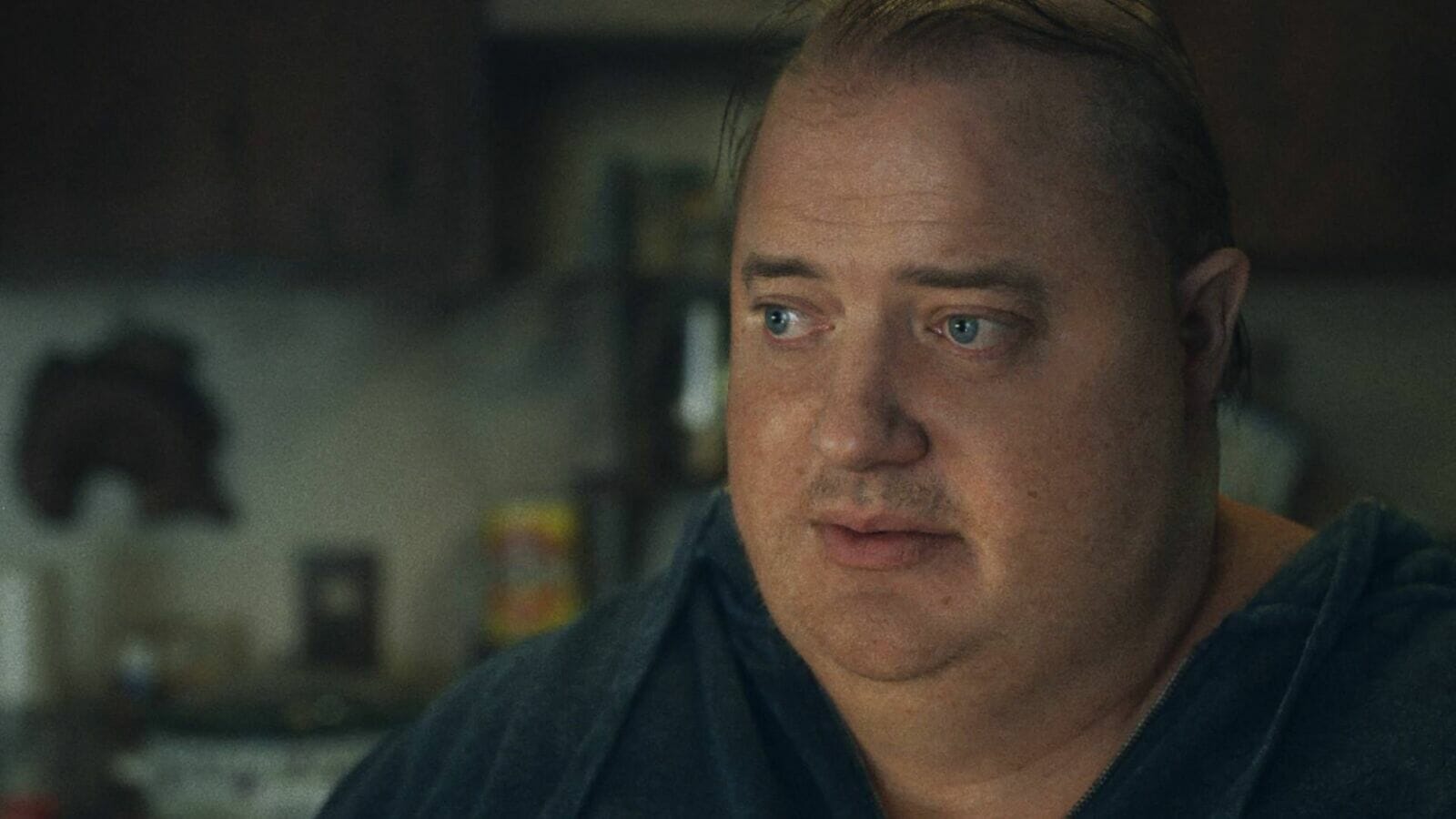After Darren Aronofsky’s dizzying, delirious mother!, an adaptation of a quiet one-set stage play seems a formally conservative turn. But The Whale, adapted for the screen by playwright Samuel D. Hunter, has more in common with mother! than its origins suggest: a captive protagonist in a claustrophobic home, a surfeit of metaphors, and the all-consuming specter of religious trauma. Just in time for Christmas!
The film stars old friend Brendan Fraser as Charlie, a morbidly obese English teacher trying to reconnect with his daughter (Sadie Sink). Suffering from congestive heart failure and without a happy prognosis, he elects to spend his twilight year teaching writing and righting wrongs. From the first shot—a videoconference class where, against all odds, all of Charlie’s students have their cameras on, but Charlie himself remains a black square—The Whale underpins Charlie’s labors with a great, lurking shame. His body disgusts him; his past horrifies him. Literally and figuratively, he’s immobile.
READ ALSO: Read all of Ryan Bordow’s movie reviews here
READ ALSO: Here’s how Arizona film incentives could attract filmmakers
Like many deceptively simple plays—and like any good mother! follow-up—The Whale is replete with double meanings. In addition to not-so-charitably describing Charlie, the film’s title refers to an essay on Moby Dick that Charlie recites to center himself, alluding to some literal or metaphorical mystery that you’ll likely solve before intended. The script, perhaps simplified and certainly condensed from its stage version, is flatly obvious about its messages and themes. Nary a profundity goes un-monologued eventually.
This blatancy is best exemplified by Thomas (Ty Simpkins), a young missionary and one of the revolving cast of characters that come and go from Charlie’s apartment. Thomas’ appearance pulls on some delicate threads—Charlie and his partner belonged to Thomas’ church before religious guilt rent them apart—and the resulting tension, belied by Thomas’ eagerness to serve and Charlie’s wholesale friendliness, paints a disharmony between Christian ethics and genuine goodness. By the third act, though, Thomas is preaching the distinction between physical and heavenly bodies, prompting Charlie to thunderously condemn—or exposit, rather—the danger of theologies that seek to save the soul but position the body as broken. Where the prior atmosphere between Thomas and Charlie was uncomfortably, tellingly suggestive, the more direct dialogue is only generally insightful. The film changes Thomas from Mormon to evangelical to better reflect the times, but its spoken observations on religion feel detached from cultural specificity.
In short, The Whale is very platitudinous. But at least it’s gloomily platitudinous. When Charlie’s tortured, torturous daughter turns up, he encourages her to process her feelings through journaling, and his writing-tips-as-life-lessons feel, despite the script’s efforts, more thin than daringly honest. But this is offset by The Whale’s fatalism. What first appears a time-worn battle between hope and cynicism becomes a final, desperate application of palpably empty hope. In a feat of inverse character development, the more we find out about the central family—the bereft Charlie, his aggrieved ex-wife, and their ghastily cruel daughter—the less faith we have in their progress. That the film legitimizes their despair without offering hope as a solution—only ever as a salve—makes hoping anyway seem downright revolutionary. Salvation is a fool’s game, a too-lofty goal; mere hope leaves room for despair and the people drowning in it.
The Whale’s performances crystallize this. Fraser, as you may have heard, is tremendous, but he’s even more tremendous than you’ve heard. His depression and self-loathing are so precisely controlled this his rare emotional breakdowns are heartbreaking. A quiver in his voice would shake me with sobs. Conversely, when he’s a foil to Sadie Sink’s more perfunctory angst, his optimism feels radical. Hong Chau, who plays Charlie’s nurse and close friend (and who is fast becoming one of my favorite working actors), turns in an equally passionate supporting performance, and Samantha Morton stops by for a just killer scene as Charlie’s ex-wife. This is a hell of an ensemble, one steeped in human fears, foibles, and failures.
Behind the camera, Aronofsky and longtime collaborator Matthew Libatique show worthy restraint. Echoing the sparse yet thoughtful production design of Charlie’s apartment, they reign in the freewheeling chaos of mother! in favor of still, studious shots and painterly compositions, and cleverly, the more limited camera movement is used to emphasize Charlie’s limited mobility. This rarely feels fatphobic or gimmicky; Aronofsky takes care to filter Charlie’s struggles through his shame and trauma instead of dwelling on his obesity in a vacuum. It’s a far more respectful take on addiction and its causes than the sensationalized Requiem for a Dream.
Empathy and respect bleed through The Whale’s screenplay, even if the adaptation isn’t as insightful as its actors. But how could it be? Fraser sets the bar astronomically high. His return is doubly as exciting as Aronofsky’s.
★★★½ (3.5/5)




